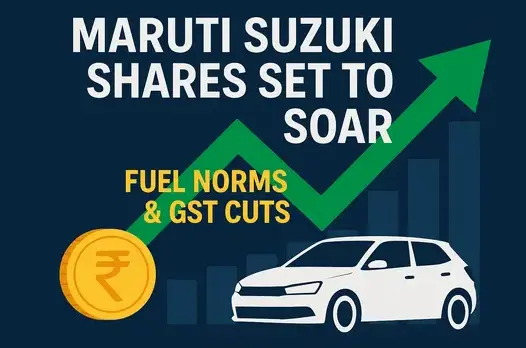
Introduction
Maruti Suzuki India Limited (MSIL) is India’s top automobile manufacturer and is continually a leader within the small and mid-size cars segment, dominating the market with its fallow models including the Alto, Swift, WagonR, and Baleno. The company consistently holds between 50 to 55% of the passenger vehicle market share, and more than half of the Indian consumers purchase a Maruti Suzuki vehicle.
With solid fundamentals and rapid adjustments to current policy changes, investor interest in Maruti Suzuki shares is developing. Historically, all sectors of the economy have improved when the government implemented favorable policies—such as tax incentives for small cars and relaxed fuel consumption norms—inviting the firm belief that an investment in Maruti Suzuki shares would deliver an investor positive performance.
Today, there are two significant catalysts for expected improving per-unit volumes and profit margins of Maruti Suzuki Shares—relaxed fuel efficiency norms for small cars and the GST reductions. As a result of the expected catalysts, we believe Maruti Suzuki stock is a potential investment opportunity; the operator is processing increased useful efficiency.
Fuel Efficiency Norms: CAFE & BS Standards
In India, fuel efficiency and emissions are governed by two principal standards:
- Corporate Average Fuel Efficiency (CAFE): This standard places targets on the amount of fuel consumption for automakers based on the weight and dimensions of their vehicle fleet.
- Bharat Stage (BS) Emission Standards: These standards establish limits on permissible air pollutants from internal combustion engine vehicles.
Both norms were designed to help decrease fuel consumption and limit vehicular emissions in-line with global environmental objectives.
Relaxation of norms relating to small cars
In the September 2025 draft policy, the Indian government proposed a relaxation of fuel efficiency norms for small petrol cars. The proposed policy would allow vehicles that weigh 909 kg or less and are less than four meters long the opportunity to also claim carbon-saving benefits due to their limited capacity for efficiency improvements. The anticipated effect is to decrease pressure on manufacturers so they do not have to accelerate small car transition to electric powertrains.
Impacts of costs of production and profit margins.
This proposed policy change can lessen research and development costs to car manufacturers like Maruti Suzuki, a leader in the small car market. Compliance relaxations will allow Maruti Suzuki to efficiently reallocate alignment of resources to increase profitability on models like the Alto.
Small Cars Benefits; Maruti Suzuki’s Small Car Market Share
Maruti Suzuki remains a strong player in the small car market, recently reporting a nearly 45% share of the Indian personal vehicle market. With these changes in fuel regulations, their dominance may strengthen, as operational costs go down, and therefore allow them to be more competitive in their pricing.
Investor Angle: Impact of Policy Changes
Policy changes frequently have an impact on stock performance (or, stocks react positively or negatively with policy changes). Over the years, Maruti Suzuki has had the benefit of several policy measures working in the company’s favor, given that whenever the Government raises or lowers excise duties, or the GST, on vehicles, Maruti’s stock price tends to make a corresponding move.
For instance, just after the September 2025 GST cuts, the stock reached a 52-week high of ₹16,438.20, having gained 51% year-to-date.
Maruti Suzuki India Limited (MSIL) enjoys an overwhelming market share for small and mid-size cars in India with models like Alto, Swift, WagonR, and Baleno. This is demonstrated by a market share of greater than 50% for passenger vehicles. Investors are excited about Maruti Suzuki’s fundamentals and its ability to respond to policy changes, encouraging investor interest.
Changes in policy released recently— relaxed fuel efficiency norms on small cars and the GST reductions— provide an opportunity to increase volumes and margins and thus is a stock to watch out for moving forward for a bullish momentum.
GST Rate Reductions & Effect on Sales
On September 22, 2025, GST 2.0 was rolled out in India with significant changes, including a reduction of the Goods and Services Tax (GST) on small cars from 28% to 18% in an effort to boost demand for low-cost vehicles, which started regaining consumer interest.
The Reduction in Prices Drives Demand in Tier 2 and Tier 3 City.
The lower GST rate, including a drop in prices below ₹4 lakh for the first time in nearly five years, has made small cars more affordable that’s attractive to buyers in Tier 2 and Tier 3 city where manageability of upper price range is achievable; for example, in Trichy, car sales rose by over 40% after the GST reduction, with many dealers reporting car sales up by 70% thereafter.
Linking to Maruti Suzuki: Anticipated Volume and revenue growth
Maruti Suzuki, a leader in this category, is directly benefitting from this policy change with record sales, and reporting to deliver over 30,000 small cars to customers on the first day of the festive season, the best performance in the last 35 years.
The increase in activity is expected to last and drive more revenue with volume.
Unexploited Investor Approaches
Rural & Semi-Urban Reach: Maruti Suzuki’s extensive presence in rural and semi-urban areas taps into growing demand, building strong sales and brand loyalty.
Supply Chain & Cost Efficiency: GST-led tax rationalization improves supply chain efficiency and lowers costs, boosting cash flow and investment appeal.
Policy-Aligned Products: By aligning new models like Alto K10 and S-Presso with revised regulations, Maruti Suzuki attracts broader customer interest.
Investor Confidence: Reduced regulatory pressure from fuel norms and GST changes lowers perceived risk, supporting potential valuation gains.
Outlook on Maruti Suzuki’s Stock
Currently, the stock for Maruti Suzuki is on a bullish trend on the back of supportive policies and demand in the market. Some of the reasons for the bullish outlook:
Policy Commitments: GST rate cuts and considerations to ease fuel efficiency norms have reduced costs to the consumer, elevating demand for small cars.
Cost Efficiency: Maruti Suzuki’s pricing and management of costs have improved profitability despite passing on some cost to the consumer.
Demand Improvement: Renewed demand has been evidenced by fresh bookings and sales, particularly within rural and semi-urban markets as demand arises with every product stream line currently being offered.
Analyst Expectations:
- Goldman Sachs has upgraded the stock to a ‘Buy’ with a target price of ₹18,900, and a potential upside of greater than 15% from here.
- Investec has raised the target price to ₹18,475, citing, “the company is well placed to benefit from rationalization in GST rates, along with potential monetary easing measures.”
- ICICI Securities expects gains of 17%, as new product launches along with supportive macro-economic conditions support its outlook.
Short-Term vs. Long-Term Potential:
Short-Term: The stock will likely benefit from the ongoing festive season and increased consumer spending, which may result in short-term appreciation.
Long-Term: With an established market position, continual product innovation, and a supportive policy environment, Maruti Suzuki is well-positioned to grow sustainably.
Risks to Consider
Investors should note that while the outlook is positive, investors must account for potential risks:
- Increasing Competition: Companies including Hyundai, Tata Motors, and Mahindra & Mahindra are increasing competition among small car manufacturers, which may impact Maruti Suzuki’s market share.
- Raw Material Costs: Changes in international raw material prices, particularly for steel and aluminum, may result in increased production costs and reductions in margins.
- EV Transition: The transition to electric vehicles is a major opportunity for the auto industry, but also poses challenges. Maruti Suzuki has a limited current EV offering, and if the company does not accelerate scaling of production, it could impact Maruti Suzuki’s competitiveness.
FAQ
Easing of fuel norms refers to less stringent government rules on fuel efficiency and emissions for vehicle types, especially related to small cars. This will benefit manufacturers by decreasing production-cost and compliance-cost, positively impacting margins and profitability.
Easing of fuel rules will help Maruti Suzuki reduce production costs of vehicles, help them price competitively, and enhance margins. This should improve investor interest in the shares. Maruti Suzuki shares have benefitted previously from favorable policy tailwinds.
Lowering of GST results in lower prices for consumers when buying small cars, which spurs demand, and particularly benefits the automotive market in Tier-2 and Tier-3 cities. For Maruti Suzuki, it means higher volume sales, revenue growth, and potentially better margins too.
The combination of easy fuel regulation, GST reduction, strong rural market growth, and marginal cost efficiencies suggests that Maruti Suzuki shares are a long-term buy-or-hold option. The shares may also provide short-term gain during festival seasons and high demand times.
Other drivers of growth include new product launches that reflect market demand, supply chain efficiencies and optimization, focus on rural and semi-urban markets, and a strong brand loyalty—all of which support revenue growth and investor confidence over the long term.
Conclusion
Given the conducive policy developments such as the easing of fuel norms and goods and services tax (GST) reductions, Maruti Suzuki’s position as India’s largest carmaker provides a strong case for growth. Additionally, the long-term drivers of revenue and profits in the company include operational efficiencies, its penetration of the rural markets, and the launch of new strategic products.
For investments, these leadership attributes make Maruti Suzuki shares a buy opportunity in the near term as well as long term. Whilst volatility does exist in the market, making a well-informed investment decision, with a consideration of policy tailwinds in place as well as structural advantages in its favor, may yield favorable even outsized returns over the cycle in India’s developing automotive market.

